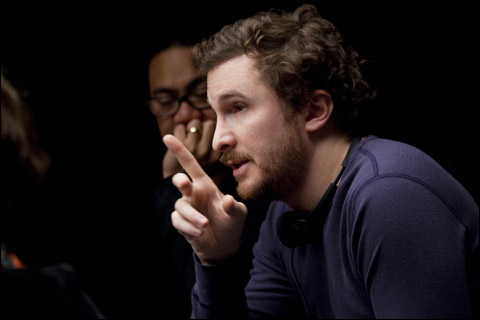
HAND-HELD Says Aronofsky, “I didn’t know if, in a really intense scene, people would wonder why Natalie wouldn’t turn to the cameraman and go, ‘Help!’ ” |
At times during the press conference that he and his star, Natalie Portman, are conducting for Black Swan, Darren Aronofsky seems to be putting on a stand-up act. But little of this humor finds its way onto the screen. If people laugh at Requiem for a Dream or The Fountain, it's usually because they're uncomfortable with the film's earnest intensity. There might be that kind of laughter at Black Swan, a self-enclosed, overheated psychodrama about a ballet dancer, played by Portman, who's driven to the brink of insanity in order to be "perfect."
"It shows the challenges and the darkness and the reality of being a ballet dancer," says Aronofsky. "But it also represents the beauty of the art, the transcendence that's possible within the art."
To convey that transcendence, Aronofsky took a counterintuitive approach to a lurid, melodramatic thriller — he shot it like a cinéma-vérité documentary.
"The whole hand-held thing was a big risk, because I had never seen a suspenseful film done that way," he acknowledges. "I didn't know if, in a really intense scene, people would wonder why Natalie wouldn't turn to the cameraman and go, 'Help!' But I liked that the first third of the film has a very different feel from the last half of the film, a naturalistic feel that makes people think they're watching the kind of movie that can't freak out like the way it freaks out."
And why do the film and its protagonist freak out? Portman, who studied psychology at Harvard, offers her expertise in that subject. "It was absolutely a case of obsessive-compulsive behavior. Scratching, bulimia, and anorexia are forms of OCD. Ballet really lends itself to that, because there's such a sense of ritual. And then they have this godlike character in their director. Which you can relate to as an actor, because when you do a film, you submit to your director that way. Your director is everything; you devote yourself to them, and you want to help create their vision."
So was Aronofsky the kind of godlike figure demanding obedience and devotion like the director of the ballet company in the movie?
"I wish I could be as manipulative as that character," he says. "I'm really way too direct. I think I've scared away a lot of A-list actors. In fact, Natalie Portman is the first A-list actor I've ever worked with in my career. They normally say, 'You want me to do what? For how long? For how little money?' "
As it turns out, Aronofsky's demands of his star were pretty extreme.
"I started with my ballet teacher a year ahead of time," says Portman about her preparation for the role. "We would do two hours a day for the first six months, and then we started doing five hours a day. We added in swimming a mile a day. And then two months before [shooting], we added the choreography, so we were doing probably eight hours a day. The physical discipline of it really helped with the emotional side of the character, because you get the sort of monastic lifestyle and the self-flagellation of a ballet dancer."